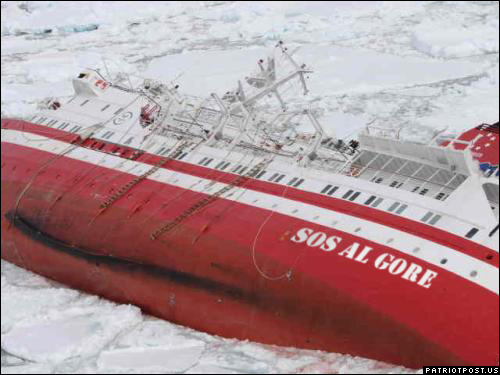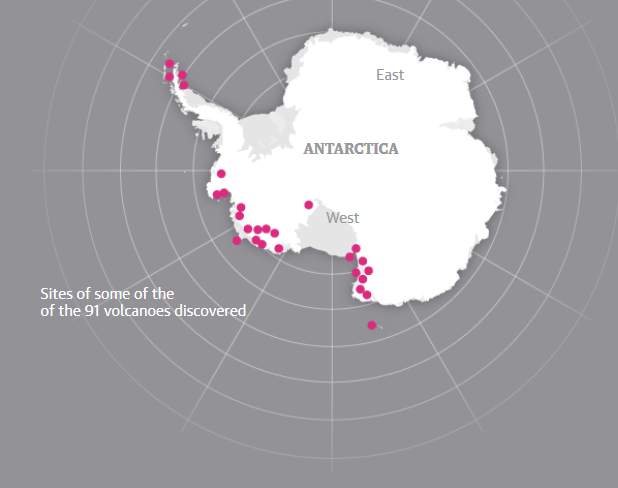It looks like you're using an Ad Blocker.
Please white-list or disable AboveTopSecret.com in your ad-blocking tool.
Thank you.
Some features of ATS will be disabled while you continue to use an ad-blocker.
28
share:
This is in addition to 47 already known about and eruption would melt more ice in region affected by climate change
Scientists have uncovered the largest volcanic region on Earth – two kilometres below the surface of the vast ice sheet that covers west Antarctica.
The project, by Edinburgh University researchers, has revealed almost 100 volcanoes – with the highest as tall as the Eiger, which stands at almost 4,000 metres in Switzerland.
Geologists say this huge region is likely to dwarf that of east Africa’s volcanic ridge, currently rated the densest concentration of volcanoes in the world.
www.theguardian.com...
91 more volcanoes, apart from the 47 already known, have been discovered in Antarctica. The geologists who discovered these volcanoes don't know how many are active, if any. But warn that we need to find out ASAP because then the Antarctic ice sheets would melt causing a rise in sea levels if any of these newly discovered volcanoes were active.
In other article we have seen how previous research also discovered that there were volcanoes in Antarctica melting the ice sheets from below the surface of the ocean. Now we know that there are even more volcanoes.
edit on 13-8-2017 by ElectricUniverse because: add and correct comment.
edit on Sun Aug 13 2017 by DontTreadOnMe because:
trimmed overly long quote IMPORTANT: Using Content From Other Websites on ATS
originally posted by: Wardaddy454
I think I know why the Antarctic ice is melting..
Ummm...touche'...
When taken as an aggregate...and when considering the possible magnetic pole shift...one wonders how much of an effect such a shift might have on tectonics...or magma distribution...
I know...I know...magnetic pole shift...not the Democrat Guam theory...but a reversal of magnetic poles in a viscous ferrous fluid...coupled with harmonics...in conjunction with floating crustal bound/rebound...
Might be a wild ride...
Just speculating...
YouSir
a reply to: ElectricUniverse
This irritates me, and is likely why I want to be against AGW so badly. (regardless of facts)
This article and instance has ZERO to do with "Climate Change", and everything to do with Nature. Man did not make those volcanoes, and man's influence will have exactly Jack # to do with their eruptions, should that take place. When AGW is tagged on everything that happens, and it's not a factor, it just seems like it's the kid nobody likes, but your mom made you hang out with him, because his mom is nice. Don't be that guy.
This irritates me, and is likely why I want to be against AGW so badly. (regardless of facts)
This is in addition to 47 already known about and eruption would melt more ice in region affected by climate change
This article and instance has ZERO to do with "Climate Change", and everything to do with Nature. Man did not make those volcanoes, and man's influence will have exactly Jack # to do with their eruptions, should that take place. When AGW is tagged on everything that happens, and it's not a factor, it just seems like it's the kid nobody likes, but your mom made you hang out with him, because his mom is nice. Don't be that guy.
The most arrogant stance my beloved human race has ever taken is the one where we can affect global climate change...
Sun spots?
Nope, it's too many suvs..
Volcanism?
Nope, it's coal use by china...
Anyone with even a passing understanding of planetological sciences sees climate change for what it is...
Jeebus, read about snowball earth #1(post Cambrian explosion) or the great dying...heck, how about the Maunder Minimum for more recent planet-wide fluctuations...
Where have you gone Dr. Kines?
We need you Liet!


-Chris
Sun spots?
Nope, it's too many suvs..
Volcanism?
Nope, it's coal use by china...
Anyone with even a passing understanding of planetological sciences sees climate change for what it is...
Jeebus, read about snowball earth #1(post Cambrian explosion) or the great dying...heck, how about the Maunder Minimum for more recent planet-wide fluctuations...
Where have you gone Dr. Kines?
We need you Liet!


-Chris
Naive very .
Yes they are there yes they can go off yes they can melt ice .
That does not mean humans should add tons of pollution to the planet .
If you really think humans cant effect the climet then tell me why citys are alest ten % warmer then country .
It is called a heat sink ( look it up and as we slash and burn open ground becomes even more of a heat sink .
From the time humans have gained so called civilization the deserts have grown and are now twice the size they were 20,000 years agaio .
thousand upon thousands of animals are now extinct . all because we are nasty dirty critters this plant has ever known .
And you prove that time and time again by saying humans cant effect our climet we have in big ways and its getting worse .
Having said alll this humans will not change even when it is to late we will just vamp up teh fighting for what is left till non is and then we will be extinct and who knows in another 300 million years maybe intelligence will rise for the first time on earth .
Right now humans consume 8 times natural out put . 8 times what earth can renew we are living on the past and there is no future .
Your great grandkids wont have to worry about any of this because you wont have any great grand kids
Yes they are there yes they can go off yes they can melt ice .
That does not mean humans should add tons of pollution to the planet .
If you really think humans cant effect the climet then tell me why citys are alest ten % warmer then country .
It is called a heat sink ( look it up and as we slash and burn open ground becomes even more of a heat sink .
From the time humans have gained so called civilization the deserts have grown and are now twice the size they were 20,000 years agaio .
thousand upon thousands of animals are now extinct . all because we are nasty dirty critters this plant has ever known .
And you prove that time and time again by saying humans cant effect our climet we have in big ways and its getting worse .
Having said alll this humans will not change even when it is to late we will just vamp up teh fighting for what is left till non is and then we will be extinct and who knows in another 300 million years maybe intelligence will rise for the first time on earth .
Right now humans consume 8 times natural out put . 8 times what earth can renew we are living on the past and there is no future .
Your great grandkids wont have to worry about any of this because you wont have any great grand kids
originally posted by: midnightstar
Naive very .
Yes they are there yes they can go off yes they can melt ice .
That does not mean humans should add tons of pollution to the planet .
If you really think humans cant effect the climet then tell me why citys are alest ten % warmer then country .
The short answer is asphalt and concrete..
This is an incontrovertible truth...both substances[ubiquitous in modern urban environs] hold, absorb, and radiate heat for substantial periods of time when exposed to UV spectrum energy(particularly uvB)...
-Chris
That's a lot of past volcanic activity in one area, which could mean diamonds:
www.zerohedge.com... onds-discovered-antarctica:
www.zerohedge.com... onds-discovered-antarctica:
a reply to: network dude
i know, they had to "include their opinion" when the discovery itself is not about the hoax that AGW is. Several research papers have shown that the Antarctic has been melting from beneath, and not from "AGW". We also know that among the 47 previously known underwater volcanoes in the Antarctic, that several have been active and were the reason why the Antarctic has been melting.
Even back in 2013 it was known that the Antarctic has been melting primarily from below.
Antarctic Ice Shelves Melt Mostly From Below
i know, they had to "include their opinion" when the discovery itself is not about the hoax that AGW is. Several research papers have shown that the Antarctic has been melting from beneath, and not from "AGW". We also know that among the 47 previously known underwater volcanoes in the Antarctic, that several have been active and were the reason why the Antarctic has been melting.
Even back in 2013 it was known that the Antarctic has been melting primarily from below.
Antarctic Ice Shelves Melt Mostly From Below
originally posted by: midnightstar
Naive very .
Yes they are there yes they can go off yes they can melt ice .
That does not mean humans should add tons of pollution to the planet .
CO2 is not a pollutant...Yet CO2, and more specifically anthropogenic CO2 is being blamed, when observations tells us that's not true.
originally posted by: midnightstar
If you really think humans cant effect the climet then tell me why citys are alest ten % warmer then country .
The heat caused by the island effects in large cities have nothing to do with climate... The island effect does not affect the global climate, it is a local phenomenon.
originally posted by: midnightstar
From the time humans have gained so called civilization the deserts have grown and are now twice the size they were 20,000 years agaio .
it is called climate change and it has occurred many times in the past and will continue to occur... mankind has nothing to do with it.
originally posted by: midnightstar
thousand upon thousands of animals are now extinct . all because we are nasty dirty critters this plant has ever known .
Maybe your hatred for the human race is because you hate yourself. You need to seek psychiatric help pronto.
originally posted by: midnightstar
Having said alll this humans will not change even when it is to late we will just vamp up teh fighting for what is left till non is and then we will be extinct and who knows in another 300 million years maybe intelligence will rise for the first time on earth .
You obviously are ignorant on the history of past civilizations... Entire civilizations have had to leave their cities because of "climate change"... Are you going to claim those ancient civilizations were driving around in suvs?...
originally posted by: midnightstar
Right now humans consume 8 times natural out put . 8 times what earth can renew we are living on the past and there is no future .
What?... Could you provide a reliable source to this claim of yours?...
originally posted by: midnightstar
Your great grandkids wont have to worry about any of this because you wont have any great grand kids
Well...within the next 100 years the entire Solar System is going to be well within a new region of space that is a million degrees hotter than the one we have been, and are leaving... So yeah, it is probable that not a lot of people will survive such changes... but it won't be because of "humans"... We will have to wait and see what happens.
BTW, before you go on on a rhetorical rant about "how nature is so different", there are species of animals and insects that destroy other species entirely...
edit on 13-8-2017 by ElectricUniverse because: add comment.
a reply to: Christosterone
So humans have zero impact on the planet's atmosphere and environment.
Got it.
Why are all these big oil execs grinning at me now?
So humans have zero impact on the planet's atmosphere and environment.
Got it.
Why are all these big oil execs grinning at me now?
Just to remind everyone, again.
When Sea Ice sheets melt...that is Ice in the sea, even if near land.....
The Sea Levels are NOT affected at all......Sea Level DO NOT rise!!!
Ice is water, Ice displaces itself in liquid water, melting ice just changes from a solid to a liquid, it does not Increase the amount of water.
The is more water (h2o) in the clouds of Earth's atmosphere, at any one time, than ALL the water in the Ice of the two poles.
When Sea Ice sheets melt...that is Ice in the sea, even if near land.....
The Sea Levels are NOT affected at all......Sea Level DO NOT rise!!!
Ice is water, Ice displaces itself in liquid water, melting ice just changes from a solid to a liquid, it does not Increase the amount of water.
The is more water (h2o) in the clouds of Earth's atmosphere, at any one time, than ALL the water in the Ice of the two poles.
originally posted by: gort51
Just to remind everyone, again.
When Sea Ice sheets melt...that is Ice in the sea, even if near land.....
The Sea Levels are NOT affected at all......Sea Level DO NOT rise!!!
Ice is water, Ice displaces itself in liquid water, melting ice just changes from a solid to a liquid, it does not Increase the amount of water.
The is more water (h2o) in the clouds of Earth's atmosphere, at any one time, than ALL the water in the Ice of the two poles.
Right, but isnt this about glaciers and ice shelves on Antarctic land?
The sheets would need to be free floating in the water to have no effect on sea level right? If the sheet is at all affixed above that point of free floating whether by land or otherwise, then the sea level would change, correct?
edit on 13-8-2017 by CreationBro because: (no reason
given)
originally posted by: Christosterone
originally posted by: midnightstar
Naive very .
Yes they are there yes they can go off yes they can melt ice .
That does not mean humans should add tons of pollution to the planet .
If you really think humans cant effect the climet then tell me why citys are alest ten % warmer then country .
The short answer is asphalt and concrete..
This is an incontrovertible truth...both substances[ubiquitous in modern urban environs] hold, absorb, and radiate heat for substantial periods of time when exposed to UV spectrum energy(particularly uvB)...
-Chris
Can you say sofa king we todd did?
news.stanford.edu...
www.skepticalscience.com...
originally posted by: CreationBro
a reply to: Christosterone
So humans have zero impact on the planet's atmosphere and environment.
Got it.
Why are all these big oil execs grinning at me now?
One thing is to have an impact on the environment a different thing is claiming mankind is to blame for the ongoing climate change when the Earth this time around began warming in the 1600s.
AGW/Climate Change is being used to push the globalist agenda for a One World Order. Except for the fact that even scientists proponents of this hoax have been caught lying, manipulating data, publishing false information, and doing everything in their power to push for this agenda behind the AGW hoax.
a reply to: CreationBro
Possibly a very minor effect, considering the size of Earth and the volume of water in the oceans.
But I do Believe the Thread title mentions "Antarctic Ice Sheets"
Please correct me if Im wrong. thx.
Possibly a very minor effect, considering the size of Earth and the volume of water in the oceans.
But I do Believe the Thread title mentions "Antarctic Ice Sheets"
Please correct me if Im wrong. thx.
On CBS this morning, I heard a report on this in which they said that if man made climate change wasn't dealt with soon, that it would cause the ice
to melt and possibly trigger the volcanoes.
I am trying to find a clip of it.
I am trying to find a clip of it.
a reply to: abago71
of course the left-wing media would claim that. Except for the fact that scientists who actually looked at the data for seismic activity noted that global earthquakes have been increasing exponentially since at least the 1990s.
profile.usgs.gov...
Not to mention the fact that it was also found out that the molten iron jet of the northern hemisphere has trebled in speed. This fact should point out that such an increase in the molten iron jet in the northern hemisphere would cause an increase in earthquakes, and an increase in geothermal and magmatic events.
Such as:
Sudden geothermal activity draws researchers to site in central Mexico
Image of The Week – Plumes of water melting Greenland’s tidewater glaciers
BTW, i do know that Antarctica is in the southern hemisphere, but wouldn't the southern hemisphere also increase the movement of the molten iron jet in the southern hemisphere?
These events, alongside the constant weakening of Earth's magnetic field since 1840, would logically point to the fact that the Earth has been going through these changes for many decades now, and these changes are increasing, and not because of mankind.
Besides, the leftist EPA administrator, Gina McCarthy, under the Obama administration conceded to the fact that the whole "climate change argument" is about reinventing a global economy.
EPA Chief concedes climate rule; it's about 'reinventing a global economy
of course the left-wing media would claim that. Except for the fact that scientists who actually looked at the data for seismic activity noted that global earthquakes have been increasing exponentially since at least the 1990s.
...
1. Introduction
Obvious increases in the global rate of large (M ≥ 7.0) earthquakes happened after 1992, 2010, and especially during the first quarter of 2014 (Table 1 and Figure 1). Given these high rates, along with suggestions that damaging earthquakes may be causatively linked at global distance [e.g., Gomberg and Bodin, 1994; Pollitz et al., 1998; Tzanis and Makropoulos, 2002; Bufe and Perkins, 2005; Gonzalez-Huizar et al., 2012; Pollitz et al., 2012, 2014], we investigate whether there is a significant departure from a random process underlying these rate changes. Recent studies have demonstrated that M ≥ 7.0 earthquakes (and also tsunamis) that occurred since 1900 follow a Poisson process [e.g., Michael, 2011; Geist and Parsons, 2011; Daub et al., 2012; Shearer and Stark, 2012; Parsons and Geist, 2012; Ben-Naim et al., 2013]. Here we focus on the period since 2010, which has M ≥ 7.0 rates increased by 65% and M ≥ 5.0 rates up 32% compared with the 1979 – present average. The first quarter of 2014 experienced more than double the average M ≥ 7.0 rate, enough to intrigue the news media [e.g., www.nbcnews.com...]. We extend our analysis to M ≥ 5.0 levels, as many of these lower magnitude events convey significant hazard, and global catalogs have not generally been tested down to these thresholds.
2. Methods and Data
We work with the Advanced National Seismic System (ANSS) catalog of M≥ 5.0 global earthquakes for the period between 1979 and 2014.3 with a primary focus on the recent interval between 2010 and 2014.3 that shows the highest earthquake rates (Table 1 and Figure 1). A variety of tests suggest that the catalog is complete down to magnitudes between M=4.6 and M=5.2, depending on the method used to assess it (see supporting information). We examine a range of lower magnitude thresholds above M =5.0 to account for this uncertainty.
...
profile.usgs.gov...
Not to mention the fact that it was also found out that the molten iron jet of the northern hemisphere has trebled in speed. This fact should point out that such an increase in the molten iron jet in the northern hemisphere would cause an increase in earthquakes, and an increase in geothermal and magmatic events.
Such as:
Sudden geothermal activity draws researchers to site in central Mexico
Image of The Week – Plumes of water melting Greenland’s tidewater glaciers
BTW, i do know that Antarctica is in the southern hemisphere, but wouldn't the southern hemisphere also increase the movement of the molten iron jet in the southern hemisphere?
These events, alongside the constant weakening of Earth's magnetic field since 1840, would logically point to the fact that the Earth has been going through these changes for many decades now, and these changes are increasing, and not because of mankind.
Besides, the leftist EPA administrator, Gina McCarthy, under the Obama administration conceded to the fact that the whole "climate change argument" is about reinventing a global economy.
EPA Chief concedes climate rule; it's about 'reinventing a global economy
new topics
-
The truth lets admit it
Aliens and UFOs: 2 hours ago -
Mass Shooting Towson, Maryland - 7 shot, 1 possibly dead
Social Issues and Civil Unrest: 6 hours ago -
Trump formally clinches Electoral College victory
2024 Elections: 10 hours ago
top topics
-
Trump formally clinches Electoral College victory
2024 Elections: 10 hours ago, 17 flags -
Was Biden's Mass clemency and pardons one last cash grab?
US Political Madness: 15 hours ago, 10 flags -
What's the buzz
General Chit Chat: 14 hours ago, 8 flags -
Mass Shooting Towson, Maryland - 7 shot, 1 possibly dead
Social Issues and Civil Unrest: 6 hours ago, 5 flags -
Elon Musk has Meeting with Nigel Farage at Mar-a-Lago
Regional Politics: 14 hours ago, 4 flags -
The truth lets admit it
Aliens and UFOs: 2 hours ago, 3 flags
active topics
-
The truth lets admit it
Aliens and UFOs • 6 • : Flyingclaydisk -
The Mystery Drones and Government Lies --- Master Thread
Political Conspiracies • 121 • : tarantulabite1 -
Quantum Computer’s, Plasmoid’s, & UAP’s
Aliens and UFOs • 24 • : Arbitrageur -
School shooting in Madison Wi.
Social Issues and Civil Unrest • 66 • : Flyingclaydisk -
Remember These Attacks When President Trump 2.0 Retribution-Justice Commences.
2024 Elections • 115 • : WeMustCare -
Trump Cancel trip to New Jersey because of drones
Aliens and UFOs • 55 • : WeMustCare -
So this is what Hamas considers 'freedom fighting' ...
War On Terrorism • 295 • : 777Vader -
Mass Shooting Towson, Maryland - 7 shot, 1 possibly dead
Social Issues and Civil Unrest • 9 • : StoutBroux -
Russias War Against Religion in Ukraine
World War Three • 26 • : Imhere -
Light from Space Might Be Travelling Instantaneously
Space Exploration • 32 • : Arbitrageur
28


